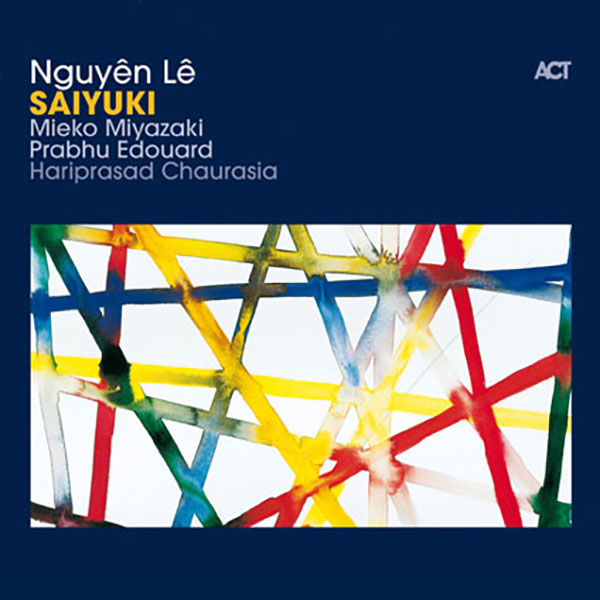
by Ian Mann
November 24, 2009
/ ALBUM
Saiyuki is quietly adventurous, an excellent distillation of different traditions, times and cultures into a coherent and consistently charming whole.
The Vietnamese born guitarist Nguyen Le has been associated with the ACT label for a number of years and has appeared on many releases as both leader and sideman. His latest release teams him with three other very different Asian musicians to explore the music of that continent.
From Japan comes Mieko Miyazaki on koto and vocals and from India there is Prabhu Edouard on tabla, percussion and vocals. The great Indian flautist Hariprasad Chaurasia adds the distinctive sound of the bansuri flute to three of the album’s ten tracks.
These days Le and the other members of the core trio live in France which adds a new dimension to the album’s title “Saiyuki” meaning “Journey To The West”. When the sixteenth century Chinese novel from which the album takes it’s name was written “The West” meant India but now the definition is expanded to take in European and American influences such as the jazz elements Le brings to the trio. Improvisation features alongside traditional forms in this pan cultural approach to music making. It’s an approach pioneered by Don Cherry, Collin Walcott and others but rarely have the main protagonists all been Asian making for a unique combination of instruments and cultures.
The album’s ten compositions all come from within the trio and the album opens with Edouard’s “Sweet Ganesh” with the composer’s tabla and vocals driving the trio. Edouard’s singing has a distinct percussive quality and this allied to Le’s electric guitar makes for a remarkably full on sound. Miyazaki’s koto is also surprisingly forceful on this spirited opener.
Le’s “Autumn Wind”, an arrangement of a traditional Vietnamese lullaby is much more impressionistic and ethereal. The beautiful melody features Chaurasia on bansuri flute alongside Le’s treated guitar and occasional synth.
Miyazaki’s “Mina Zuki” honours the Japanese “month of water”-June to European and American listeners. Koto and guitars simulate the sound of raindrops, Chaurasia’s flute weaves in and out and Edouard provides rhythmic impetus on yet another beautiful tune.
Two Edouard compositions follow both arranged for the trio by Le. “Mayur” features the distinctive, slippery sound of Le’s fretless guitar. Rock elements combine well with the ethnic instruments on this dramatic tune depicting the “dance of the sacred peacock.”
“Sangam”, the Sanskrit word for “joyful encounter” is a good natured celebration of the trio and also features the final guest appearance from Chaurasia. With joyous singing from Miyazaki and Edouard the mood is one of total optimism.
Le describes “Azur” as a jazz composition with a Japanese taste. His electric guitar is the dominant voice, sounding sometimes a little like John Abercrombie on Walcott’s “Cloud Dance”, but Miyazaki and Edouard also have important parts to play, the tablas give the piece an Indian flavour too.
Miyazaki’s “Izanagi Izanami” celebrates the union of the god and goddess of life in Japanese mythology. The centrepiece of the song is the impassioned vocal duet between Miyazaki and Edouard.
Le’s “Hen Ho” has featured in his repertoire since his 1997 ACT release “Tales From Viet-Nam” and remains one of his personal favourites due to it’s openness and scope for improvisation. In this version there are some free-wheeling passages for both guitar and koto which must have been great fun to play.
“Nanae Goromo” or the “garments of the four seasons” is a trio composition and one of the lengthier tracks on the album. As wide ranging as it’s title suggest it builds through Miyazaki’s ethereal vocal and koto incantations and Le’s eerie e bow guitar to a more forceful tabla driven section where guitar and koto intermesh before fading to silence.
The closing “Ila” is a tune by Edouard, arranged by Le and incorporating a poem by the pioneering Japanese feminist Akiko Yosano here recited by Miyazaki. It’s a serene way to close an album that in Le’s words “weaves the silk of an Asia with no borders.”
There is a strong pictorial quality to this music on this album which seems to echo the Japanese and Indian prints reproduced on the album inlay. Despite their different cultural backgrounds the players and instruments mesh together perfectly to make a wonderfully homogenised sound with the interplay between guitar and koto particularly engrossing. Le’s electric guitar gives jazz and rock listeners an anchor from which to advance and these extended vignettes are exactly the kind of thing that would go down a storm on Radio 3’s “Late Junction” programme. This is an album that may appeal to world music enthusiasts more than jazzers but inquisitive listeners of all stripes should find something to enjoy here. At times I was reminded of the ethnic prog rock of the grossly underrated 70’s band Jade Warrior, fans of Damon Albarn’s “Monkey” opera should find something familiar here too.
“Saiyuki” is quietly adventurous, an excellent distillation of different traditions, times and cultures into a coherent and consistently charming whole.
blog comments powered by Disqus